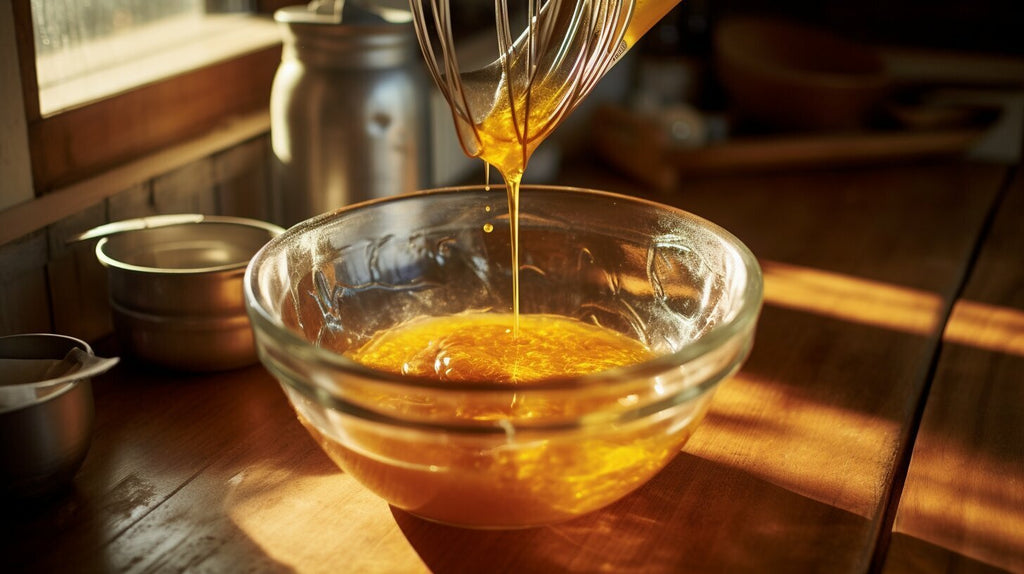
Emulsifiers: The Food Additives in Foods and Emulsifier Food Additive
SUBSCRIBE TO OUR BLOG
Promotions, new products, and recipes.
Hey there all you food lovers and culinary explorers. Ever wonder what works behind the scenes to make our food taste so darn delicious? Well, it's often due to something called 'emulsifiers'. These magical wizards of the culinary world, found in our food, have a crucial role to play in food tech. Let's take a tasty dive into what these emulsifiers are all about and how they're used in our food. This, my friends, is a little glimpse into the fantastic world of emulsifiers, brought to you by none other than Cape Crystal Brands! Buckle up and get ready.
Understanding Emulsifiers: The Common Food Additives
Hey folks, let's get down to business. I bet you've come across food additives mentioned on food product labels and wondered "What the heck are these things?" Well, today we're gonna break it down - we're talkin' emulsifiers. These common emulsifiers are added to foods all the time. So why are they important? They're like the peacekeepers between oil and water in food emulsions, prodding these feisty fellas to blend. Simply put, they're mighty good at emulsifying. Some of our everyday foods have these emulsifiers that are mainly protein-based. Yeah, proteins are not just for bodybuilding, they help the water and fat play nice. Remember folks, knowledge is power when it comes to health, so keep learning about what's in your food.

Pouring oil into the water to show it doesn't mix.
Natural Emulsifiers vs Synthetic: Impact on Food Products
Alright, let's talk emulsifiers. So, what's the scoop on natural emulsifiers versus synthetic ones in our food products? Well, here's the lowdown. Natural emulsifiers, like lecithin and gum, are mainly sourced from plants, while synthetic emulsifiers often come from esters. Why is this important for your diet? Well, it's been found in a study that synthetic emulsifiers could disrupt our metabolic processes. Still with me? Good. Anyway, carrageenan is a major player among synthetic emulsifiers, whereas oils are vital in natural emulsifiers. These agents help balance water and oil in foods, and, don't freak, but they're considered food additives. Yup! Our friend the FDA regulates this stuff to ensure all's above board. So, next time you check product labels, remember: that natural or synthetic, dietary emulsifiers are a part of our grub. But as always, everything in moderation, folks!
Natural Emulsifiers
- Beeswax: Derived from the honeycomb of the bee. It is a waxy substance that helps to bind and emulsify oils and water together.
- Soy Lecithin: Extracted from soybeans, this natural emulsifier helps to stabilize mixtures of water and oil.
- Sunflower lecithin: Extracted from sunflower seeds, this natural emulsifier helps to stabilize mixtures of water and oil.
- Egg Yolk: Contains lecithin, a natural emulsifier that helps to mix oil and vinegar for making mayonnaise.
- Honey: Natural emulsifier derived from the nectar of flowers gathered by bees, useful in food and skincare products.
- Mustard: The mucilage from its seeds acts as a natural emulsifier for culinary purposes.
- Gum Arabic (Acacia Gum): Derived from the sap of the acacia tree.
- Xanthan Gum: Produced by bacterial fermentation.
- Guar Gum: Extracted from guar beans.
- Locust Bean Gum (Carob Gum): Derived from the seeds of the carob tree.
- Agar: A gelatinous substance derived from red seaweed.
- Carrageenan: Extracted from red seaweeds.
- Pectin: Found in the cell walls of plants.
- Gelatin: Derived from animal collagen.
- Sodium Caseinate: Derived from milk.
Synthetic Emulsifiers
- Sorbitan Monostearate: Sorbitan Monostearate is synthesized by the esterification of sorbitol with fatty acids such as stearic acid, followed by dehydration to yield anhydrides.
- Polysorbate 80: This synthetic emulsifier is made by reacting oleic acid with sorbitol to form a sorbitan ester, which is then ethoxylated with ethylene oxide to create Polysorbate 80.
- Glycerol Monostearate: Glycerol Monostearate is made through a process where glycerin is reacted with stearic acid under high heat and pressure to create this synthetic emulsifier.
- Carboxymethyl Cellulose: Carboxymethyl cellulose is synthesized by reacting cellulose with chloroacetic acid in the presence of sodium hydroxide.
- Anionic Emulsifier: An anionic emulsifier is made by reacting stearic acid with ethylene oxide, then reacting this product with sulfur trioxide to produce anionic emulsifier.
- Sodium Lauryl Sulfate: This synthetic emulsifier is created by the sulfonation of lauryl alcohol, followed by neutralization with sodium carbonate or sodium hydroxide.
- Polyglycerol Polyricinoleate: Polyglycerol Polyricinoleate is created by combining polyglycerol and ricinoleic acid under high heat and pressure in an esterification reaction.
- Dioctyl Sodium Sulfosuccinate: Dioctyl Sodium Sulfosuccinate is synthesized by treating maleic anhydride with 2-ethylhexanol, followed by a sulfonation and neutralization with sodium hydroxide.
- Polysorbate 60: This synthetic emulsifier is made by reacting stearic acid with sorbitan under pressure and heat to create Sorbitan Stearate, which is then ethoxylated to form Polysorbate 60.
- Lecithin: While lecithin can be obtained naturally, synthetic lecithin is made by the reaction of glycerin with fatty acids, followed by reactions with phosphoric acid and choline.
Common Emulsifiers in Foods: What to Look Out for
Here is a bit more about common emulsifiers in foods and what to look out for. So, whether it's a creamy food emulsion or an oil and water combo, emulsifiers are processed into many foodstuffs, acting as vital ingredients in creating that perfect texture. But what's in these additives? Well, esters are often used to create that super smooth emulsion, alongside health-conscious options like carrageenan, and gums. Yet, not all emulsifiers are as healthy. Some, you might want to avoid. It's important to consider the emulsifying elements, but they might impact your health negatively. As a chef, I always recommend being aware of what you eat. Look out for these ingredients, opt for products with no hidden additives, and live life to the full. Remember, a bit of insight goes a long way in emulsions and life alike.

Egg yolks are a natural emulsifier.
The Role of Emulsifiers in Food: Enhancing the Appeal of Foods
So what's an emulsifier? It's a food agent that has magical fusion powers, bringing together ingredients that wouldn't mix otherwise. It's a big deal in food products, because who likes a separated salad dressing or lumpy ice cream, right? Not just the looks, emulsifiers amp up the texture too. The FDA approves of them, just so you know. They come in two phases - ensuring stability. These ingredients also bring benefits beyond food – like heart-friendly OMEGA-3 fatty acids. But remember - while food additives are super handy in many foods, being a savvy user means checking out the labels and knowing what's in your grub. So, keep enjoying delicious dishes and stay informed!
The Safety and Regulation of Emulsifiers: Ensuring Food Health
It might seem too scientific and complicated, but the safety and regulation of emulsifiers are key to food health. The FDA plays an ace role in overseeing this ingredient with rigid processes, ensuring that the food we consume is not just delish, but entirely safe. Various scientific studies dive into the metabolic effects of emulsifiers, shedding light on how they interact with our bodies. So, checking out the product site might not be a bad idea. Remember, that water is often paired with these additives in foods. Emulsifiers aren't only about making the food look good - they're about making you feel good too! Our brand, Cape Crystal Brands, stands by the study of food additives and FDA regulations, ensuring top-notch quality and health in our products. Stay aware, stay informed, and stay healthy!

The FDA oversees food safety including emulsifiers.
Unpacking the Health Effects of Emulsifiers: Gut Health
So, let's dive into unpacking the health effects of emulsifiers, shall we? When thinking about your gut health, food, and dietary emulsifiers, which are fairly common additives, pop up on the radar. These additives often stir up concerns about health, as numerous studies have started to examine their effects on our gut microbiome. Who knew that stuff like water and oil would need help to get along in our foods? Some studies indicate they might disrupt our gut health. Of course, more study and research are needed in this area, especially around the metabolic effects. So while the FDA says these additives are on the up and up, it's always a good idea to stay informed and conscious about what's going into your body!
Identifying Emulsifiers on Food Labels: Food Additives Under the Axe
Okay folks, let's chat about identifying emulsifiers on food labels. Those food additives are usually lurking there. You know, those chemicals in your favorite foods? Yep, they're often hidden in plain sight. Heading to the kitchen, I grabbed a random jar and gave the label a squint. Found something called 'E471' - sounds more like a droid from Star Wars, right? Well, in the food world, it's one of those additives also known as an emulsifier. The FDA controls these additives, but some studies suggest they might have metabolic effects. Wouldn't it be grand if they were outed, the effects clearer? But here's a trick, my culinary comrades - look for the naturals! There aren't any preservatives in water, but it can emulsify certain foods, no problem. So even as we enjoy our food, let's always study those food labels, okay? To good health and happy cooking, Chef Edmund from Cape Crystal Brands here, signing off.
Reducing Emulsifier Intake: Tips and Alternatives for Health-Conscious Food Lovers
You're probably aware of additives and their emulsifying magic, transforming oil and water into a heavenly emulsion. But I bet you didn't know that reducing emulsifier intake can be a game-changer for our health. Let's face it, the FDA approves emulsifiers, but recent studies suggest that they may lead to metabolic conditions. The effects are still under investigation and we need more studies before we jump to conclusions. In the meantime, why not subscribe to Cape Crystal Brands for healthier choices? It's like a study group for folks who care about what they eat! How cool is that?
Conclusion
So, there you have it, guys. Emulsifiers are like the middlemen between oil and water in our food, helping to keep everything mixed and tasty. They are in a bunch of foods we eat daily, sometimes without even realizing it. So next time you pick a product by Cape Crystal Brands, you'll know exactly what's happening when you read 'emulsifier' in the ingredients. Remember, they're not the bad guys. Like in a perfectly blended gravy, they're working to ensure every bite is as good as the last. Stay curious and keep cooking!
For further reading: Sunflower Lecithin: Its Benefits and Side Effects


|
About the Author Ed is the founder of Cape Crystal Brands, editor of the Beginner’s Guide to Hydrocolloids, and a passionate advocate for making food science accessible to all. Discover premium ingredients, expert resources, and free formulation tools at capecrystalbrands.com/tools. — Ed |
Enjoyed this post? Subscribe to The Crystal Scoop
Food-science tips, ingredient know-how, and recipes. No spam—unsubscribe anytime.
- Choosing a selection results in a full page refresh.



